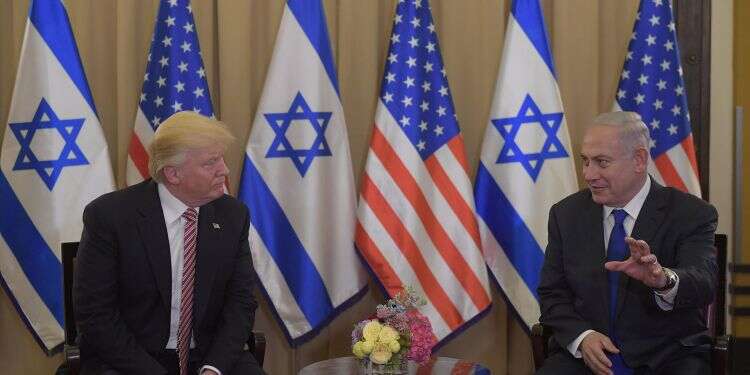Prime Minister Benjamin Netanyahu touted on Sunday the ongoing talks with President Donald Trump regarding a future defense pact with the United States, dismissing criticism that it could result in restrictions on Israeli military operations.
Speaking at a special meeting of the cabinet in the Jordan Valley, Netanyahu said: "A defense treaty with the US will not hurt our freedom to act. After being re-elected, I will move to quickly apply Israeli sovereignty in the Jordan Valley and will ask the cabinet to adopt a special resolution to develop this area."
Netanyahu made the comments a day after Trump said he had spoken with the Israeli leader about a possible mutual defense treaty between the two nations, a move that could bolster Netanyahu's re-election bid just days before Israelis go to the polls.
"I had a call today with Prime Minister Netanyahu to discuss the possibility of moving forward with a Mutual Defense Treaty, between the United States and Israel, that would further anchor the tremendous alliance between our two countries," Trump said on Twitter.
Follow Israel Hayom on Facebook and Twitter
He added that he looked forward to continuing those discussions later this month on the sidelines of the United Nations General Assembly session in New York.
Netanyahu thanked Trump, saying in a tweet that Israel "has never had a greater friend in the White House," and adding that he looked forward to meeting at the UN "to advance a historic Defense Treaty between the United States and Israel."
The timing of Trump's tweet, just days before Israel's election on Tuesday, appeared aimed at buttressing Netanyahu's bid to remain in power by showcasing his close ties to Trump.
Opinion polls predict a close race, five months after an inconclusive election in which Netanyahu was tasked by President Reuven Rivlin to put together a coalition government but failed.
Netanyahu's Likud party is running neck-and-neck with the centrist Blue and White party led by former IDF chief of staff Benny Gantz, who has focused heavily on looming corruption charges that Netanyahu faces.
In a televised interview with Israel's Channel 12 later on Saturday, Netanyahu made a direct appeal to voters based on the treaty. "I'm going to get us a defense pact that will provide us with security for centuries but for that, I need your votes," he said.
Trump previously bolstered Netanyahu's candidacy when he recognized Israel's sovereignty over the Golan Heights ahead of the elections earlier this year.
Some Israeli officials have promoted the idea of building on Netanyahu's strong ties to the Trump administration by forging a new defense treaty with the United States, one that is focused especially on guarantees of assistance in any future conflict with Iran.
Trump provided no details, but a mutual defense treaty could obligate the United States to come to Israel's defense if it is attacked.
Foreign Minister Yisrael Katz said earlier this month that a pact should apply to "defined issues – nuclear threats and the matter of long-range missiles aimed by Iran at Israel."
"We have means of offense and defense, but this would spare us the need to earmark enormous resources on a permanent basis and for the long-term in the face of such threats," Katz told Ynet TV.
Netanyahu's rival Gantz assailed the idea as a "grave mistake," arguing it would strip Israel of military autonomy.
"This is not what we want," he told a conference in Jerusalem. "We have never asked anyone to get killed for us. We have never asked anyone to fight for us. And we have never asked anyone's permission to defend the State of Israel."
Outside of NATO and the Rio Treaty with Latin American countries, the United States has separate mutual defense treaties with Japan, South Korea, the Philippines, Australia and New Zealand.




